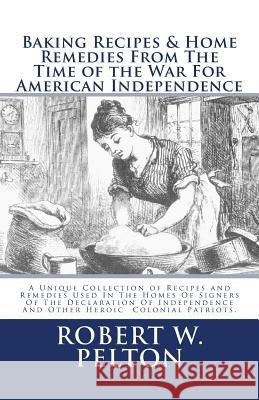Baking Recipes & Home Remedies From The Time of the War For American Independence: Special Yorktown Edition » książka
Baking Recipes & Home Remedies From The Time of the War For American Independence: Special Yorktown Edition
ISBN-13: 9781456461379 / Angielski / Miękka / 2011 / 456 str.
Baking Recipes & Home Remedies From The Time of the War For American Independence: Special Yorktown Edition
ISBN-13: 9781456461379 / Angielski / Miękka / 2011 / 456 str.
(netto: 65,74 VAT: 5%)
Najniższa cena z 30 dni: 68,46
ok. 16-18 dni roboczych.
Darmowa dostawa!
Baking in the American Colonies was far from an easy task. In fact, it was an incredibly complicated endeavor, and certainly not one to be taken lightly. The women of the house made quite an art out of baking tasty loaves of bread, pastry, pies, cakes, cookies, and all of their other homemade goodies. Large brick ovens, found in every home of the brave and hearty new immigrants had been left behind in England, Ireland and Scotland. The new settlers in America couldn't at first find much clay for making bricks. Certainly none could be found along the desolate shores of the broad Atlantic where the Pilgrims landed. And the Colonists were not at first equipped to manufacture bricks. Therefore, bricks were scarce in the new land. Not only were homemakers expected to know how to prepare the mixtures, they also had to make certain the fireplace was hot enough for baking. The coals had to be raked and banked and ready for cooking. Should the fire go out, a family member was handed a "fire spoon" and told to rush over to a neighbor and borrow some hot coals to start a new fire. Cooking? Yes, cooking, because most baking was initially done by placing the bread or cake or rolls directly on the smoldering coals. Or it was later done by placing the baked goods in front of the hearth in a dutch oven. Many other recipes handed down through a family were no more than a simple a handwritten list of ingredients. There were no instructions telling the woman of the house what to do with them. Mothers and daughters in the Colonies were expected to already know how to properly mix the ingredients. Susannah Carter became a household name in the kitchens of almost every Colonial housewife. Her popular cookbook, The Fruigal Housewife or Female Companion was reprinted in 1772 Boston. The man credited with making the printing plates for this cookbook might have otherwise been forgotten. But he was later made a legend by Henry Wadsworth Longfellow's when he wrote his fabled "The Midnight Ride of Paul Revere."
Zawartość książki może nie spełniać oczekiwań – reklamacje nie obejmują treści, która mogła nie być redakcyjnie ani merytorycznie opracowana.











